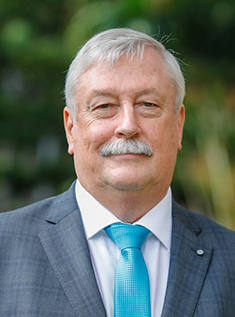
 It is an honour to contribute to this edition of the Australian Journal of Emergency Management and I take this opportunity to acknowledge the incredible efforts of the many staff and volunteers in the disaster management, health, police and emergency service and other frontline sectors during these unparalleled times.
It is an honour to contribute to this edition of the Australian Journal of Emergency Management and I take this opportunity to acknowledge the incredible efforts of the many staff and volunteers in the disaster management, health, police and emergency service and other frontline sectors during these unparalleled times.
To say we are in challenging and complex times would indeed be an understatement. COVID-19 has tested us all with new variants, new restrictions and new challenges. It has also tested our thinking, our work practice, and our ways of life. We now find ourselves gearing up for the bushfire, storm and cyclone seasons in Australia with the concurrent threat of COVID-19.
In the disaster management sector, our personnel have been working alongside health and frontline workers to respond to the pandemic for over 18 months. Fatigue management must form a major part of disaster management plans. At the top of our to-do lists must be ensuring the health and wellbeing of people, having contingency arrangements in place and looking to upskill and diversify the sector while delivering for the community.
COVID-19 has taught us that we must not only expect the unexpected, but we must plan and prepare for the unexpected. This underscores the importance of working together, sharing knowledge and ensuring we have robust continuous improvement mechanisms.
It has never been more important to identify and embed learnings in our daily practice and to truly commit to learning from lessons. Post-event debriefings and reviews are an important part of the learning process. But we must go further than identifying lessons. Embedding the learnings and testing the lessons is a vital part of closing the loop. It ensures we don’t suffer from learning amnesia and continue to track our lessons and learnings.
Another contributing practice is tracking progress. Robust monitoring and evaluation programs are a good way to keep on top of the progress made on previous report recommendations so that we don’t need to re-learn old lessons.
In this edition of the Australian Journal of Emergency Management, I would like to draw attention to an article on the K’gari Bushfire Review recently undertaken by the Office of the Inspector-General of Emergency Management (IGEM) in Queensland. Our team recently returned to the island to debrief with locals and fire management agencies on the outcomes of the review.
It has been pleasing to see the great progress made towards greater inclusivity of the community in bushfire planning and hazard-reduction activities through the Locality Specific Fire Management Group for K’gari.
IGEM looks forward to working with its stakeholders to track the progress and effects of the review’s recommendations to deliver ongoing improvements in Queensland’s disaster management arrangements.
Alistair Dawson APM
Inspector-General Emergency Management Queensland


